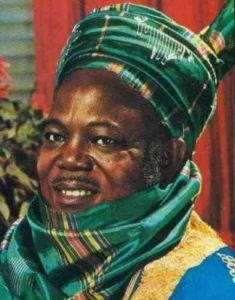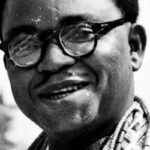AHMADU BELLO
- 3 Min Read
Ahmadu Bello (June 12, 1910 – January 15, 1966) was a Nigerian political leader who served as the spokesman for Northern Nigeria during the country’s struggle to gain independence from the British colonial government. Bello was the Sardauna of Sokoto and is considered one of the founding fathers of modern Nigeria. He combined traditional leadership qualities with a deep knowledge of Western governance.

PHOTO CAPTION: Ahmadu Bello
He was born in Rabbah, Sokoto State. The son of a district head and heir to the Sokoto Caliphate, his great-grandfather was Sultan Bello, the founder of Sokoto and son of the revered Shaykh Usman Dan Fodio. Ahmadu Bello received his education first at the Sokoto Provincial School, the only modern school at the time in the Sokoto province. Then, he proceeded to the Katsina Teacher’s Training College. After spending five years at Katsina, he was appointed by the Sultan to become a teacher at the Sokoto Middle School, his former school which had undergone rapid transformation.
In 1934, he was made the district head of Rabbah, four years later, he was promoted and sent to Gusau to become a divisional head. In 1938, he made an unsuccessful bid to become the new Sultan of Sokoto. The successful sultan immediately conferred upon Sir Ahmadu Bello the traditional, now honorary, title of Sarduna, alternatively spelled Sardauna, and elevated him to the Sokoto Native Authority Council. In 1948, he was offered a scholarship to study local government administration in England. Ahmadu Bello took the scholarship sensing he needed to shore up his knowledge about the process of governance.
After returning from England, he was nominated to represent the province of Sokoto in the regional House of Assembly. As a member of the assembly, he was a notable voice for northern interest and embraced a style of consultation and consensus with the major representatives of the northern emirates: Kano, Bornu and Sokoto. In the first elections held in Northern Nigeria in 1952, Sir Ahmadu Bello won a seat in the Northern House of Assembly, and became a member of the regional executive council as minister of works. Bello was successively minister of Works, of Local Government, and of Community Development in the Northern Region of Nigeria.
In 1954, Bello became the first Premier of Northern Nigeria. In the 1959 independence elections, Bello led the NPC to win a plurality of the parliamentary seats. Bello’s NPC forged an alliance with Dr. Nnamdi Azikiwe’s NCNC (National Council of Nigeria and the Cameroons) to form Nigeria’s first indigenous federal government which led to independence from Britain. In forming the 1960 independence federal government of the Nigeria, Bello as president of the NPC, chose to remain Premier of Northern Nigeria and devolved the position of Prime Minister of the Federation to the deputy president of the NPC, Abubakar Tafawa Balewa.
Bello’s greatest legacy was the modernisation and unification of the diverse people of Northern Nigeria. Ahmadu Bello’s many political accomplishments include the establishment of the Northern Regional Development Corporation or NRDC (subsequently known as the Northern Nigeria Development Corporation or NNDC), the Bank of the North, the Broadcasting Company of Northern Nigeria (BCNN) and the Nigeria Citizen Newspapers.
He was assassinated by Igbo officers on 15 January 1966 military coup which toppled Nigeria’s post-independence government. He was still serving as premier of Northern Nigeria at the time. The Ahmadu Bello University is named after him.
EA




